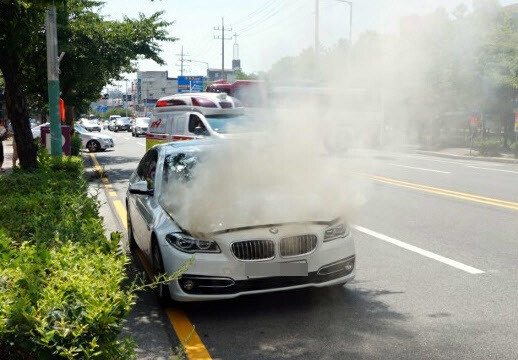hankyoreh
Links to other country sites 다른 나라 사이트 링크
[Editorial] Punitive damage regime should be strengthened for BMW fires

On Aug. 4, yet another German-manufactured BMW sedan caught on fire, adding to a string of such incidents. Once again, the car in the accident was a BMW 520d – the model affected in 19 out of a total of 32 fires in BMW vehicles since the beginning of this year, including the latest incident. What makes this even more shocking is the fact that this accident occurred the very day after South Korea’s Ministry of Land, Infrastructure and Transport recommended that people refrain from driving BMW vehicles. This is the first time the government has advised against driving a specific car.
Despite the spate of fires in a specific model in South Korea, BMW Korea failed to take timely action. The company came up with a recall plan in June, after Seoul had noticed the disturbing frequency of the fires and launched a probe into manufacturing defects. This action came too late. We’re reminded of the “Diesel Gate” incident in which Audi Volkswagen Korea was lambasted for discriminating against Korean customers.
The government needs to consider strengthening the punitive damages regime as a way of holding manufacturers accountable and reducing harm to consumers. The punitive damages regime under the current Product Liability Act, which has been in place since April, is thought to be inadequate. The damages are capped at three times the amount of damage, and the regime only comes into play in the event of loss of life or serious physical injury. The BMW fires don’t fall under this rubric.
In the US, there was apparently a case in 2005 in which a customer who had bought a Mercedes-Benz worth US$56,000 received US$480,000 in compensation—more than eight times the value.
Along with beefing up the damages regime, we also need to allow class action lawsuits. Such lawsuits – in which a judgment against an offender benefits all the victims even though only some of them are actually plaintiffs in the case – is available in the US and some countries in Europe. Because there are no class action lawsuits in South Korea, separate lawsuits are being filed by groups of customers in the BMW incident.
While announcing the launch of a detailed probe into BMW vehicles on Aug. 5, the Ministry of Land, Infrastructure and Transport said it would be putting together a joint public-private team of investigators. This step was taken in consideration of the severity of this matter. Until it released the advisory to avoid driving BMW vehicles, the Ministry had been criticized for failing to take appropriate action in a timely manner.
There were also suspicions that the Ministry was handling the company with kid gloves because it manufactures expensive cars. We hope the Ministry will clear itself of such criticism and suspicions through a painstaking probe and appropriate follow-up measures.
Please direct comments or questions to [english@hani.co.kr]

Editorial・opinion
![[Column] Life on our Trisolaris [Column] Life on our Trisolaris](https://flexible.img.hani.co.kr/flexible/normal/500/300/imgdb/original/2024/0505/4817148682278544.jpg) [Column] Life on our Trisolaris
[Column] Life on our Trisolaris![[Editorial] Penalties for airing allegations against Korea’s first lady endanger free press [Editorial] Penalties for airing allegations against Korea’s first lady endanger free press](https://flexible.img.hani.co.kr/flexible/normal/500/300/imgdb/original/2024/0502/1817146398095106.jpg) [Editorial] Penalties for airing allegations against Korea’s first lady endanger free press
[Editorial] Penalties for airing allegations against Korea’s first lady endanger free press- [Editorial] Yoon must halt procurement of SM-3 interceptor missiles
- [Guest essay] Maybe Korea’s rapid population decline is an opportunity, not a crisis
- [Column] Can Yoon steer diplomacy with Russia, China back on track?
- [Column] Season 2 of special prosecutor probe may be coming to Korea soon
- [Column] Park Geun-hye déjà vu in Yoon Suk-yeol
- [Editorial] New weight of N. Korea’s nuclear threats makes dialogue all the more urgent
- [Guest essay] The real reason Korea’s new right wants to dub Rhee a founding father
- [Column] ‘Choson’: Is it time we start referring to N. Korea in its own terms?
Most viewed articles
- 1New sex-ed guidelines forbid teaching about homosexuality
- 260% of young Koreans see no need to have kids after marriage
- 3Presidential office warns of veto in response to opposition passing special counsel probe act
- 4[Column] Life on our Trisolaris
- 5Months and months of overdue wages are pushing migrant workers in Korea into debt
- 6OECD upgrades Korea’s growth forecast from 2.2% to 2.6%
- 7S. Korea discusses participation in defense development with AUKUS alliance
- 8[Editorial] Penalties for airing allegations against Korea’s first lady endanger free press
- 9Opposition calling for thorough investigation into Pres. Park’s unelected power broker
- 10Ruling and opposition parties agree to special prosecutor for Pres. Park/Choi Sun-sil scandal